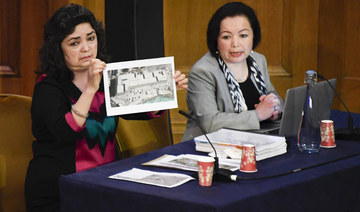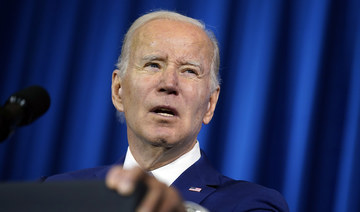WASHINGTON: Democrats were picking up the pieces Thursday following the collapse of their top-priority voting rights legislation, with some shifting their focus to a narrower bipartisan effort to repair laws Donald Trump exploited in his bid to overturn the 2020 election.
Though their bid to dramatically rewrite US election law failed during a high-stakes Senate floor showdown late Wednesday, Democrats insisted their brinksmanship has made the new effort possible, forcing Republicans to relent, even if just a little, and engage in bipartisan negotiations.
The nascent push is focused on the Electoral Count Act, an 1887 law that created the convoluted proces s for the certification of presidential election results by Congress. For more than 100 years, vulnerabilities in the law were an afterthought, until Trump’s unrelenting, false claims that voter fraud cost him the 2020 election culminated in a mob of his supporters storming the Capitol.
An overhaul of the Gilded Age statute could be Democrats’ best chance to address what they call an existential threat to American democracy from Trump’s “big lie” about a stolen election. But with serious talks only beginning in the Senate and dwindling time before this year’s midterm elections, reaching consensus could prove difficult.
“We know history is on the side of voting rights, and we know that forcing leaders to take stands will ultimately move the ball forward,” Senate Majority Leader Chuck Schumer said Thursday.
Just weeks ago, many Democrats were adamant that updating the Electoral Count Act was no substitute for their voting legislation. Updating the 1887 law, they pointed out, would do nothing to counter the Trump-inspired push in 19 states to make it more difficult to vote.
They still hold that position, but after the defeat of their marquee elections bill, they are running out of options. Meanwhile, Trump loyalists are girding for the next election, working to install sympathetic leaders in local election posts and, in some cases, backing political candidates who participated in the riot at the US Capitol.
Biden conceded this week that updating the electoral bill may be Democrats’ best opportunity to pass voting legislation through a 50-50 Senate, where much of his agenda has stalled.
“I predict to you they’ll get something done,” Biden told reporters Wednesday.
Any legislation would have to balance Democrats’ desire to halt what they view as a GOP plan to make it more difficult for Black Americans and other minorities to vote with Republican’s entrenched opposition to increased federal oversight of local elections.
“What other things could be put in there?” said South Carolina Rep. Jim Clyburn, the No. 3 House Democrat and a senior member of the Congressional Black Caucus. “I want to deal with more than just counting the votes for the president. I want to be sure that we count the votes for everybody else. So voter nullification like they’re doing in Georgia, I think it can be addressed.”
Republicans involved in the effort to update the Electoral Count Act acknowledge that the bill would need a wider focus.
Sen. Susan Collins of Maine is holding bipartisan talks with Republican Sens. Roger Wicker of Mississippi, Thom Tillis of North Carolina and Mitt Romney of Utah, as well as Democratic Sens. Joe Manchin of West Virginia, Jeanne Shaheen of New Hampshire and Kyrsten Sinema of Arizona.
“It’s such a needed thing,” said Manchin, who added that the narrower scope was “the first place” Democrats “should have started.”
Manchin and Sinema effectively tanked Democrats’ marquee bill Wednesday, joining Republicans in voting against a rule change that would have allowed the party’s voting legislation to pass with a simple majority.
Collins has proposed new protections for poll and elections workers, some of whom received chilling threats to their safety after the 2020 election. She has also called for more funding for local elections. Manchin wants harsh criminal penalties for those convicted of intimidating or threatening poll and election workers.
“It’s a heavy lift, but if we continue to get people to talk there’s a path,” said Tillis, who said tensions over the Democrats’ failed voting bill will need to cool before coalition building can seriously begin. “We are going to have to have more Republicans get on board because there are going to be protest votes.”
But at its core, many Republicans want any legislation to primarily focus on the Electoral Count Act.
“This is directly related to Jan. 6,” Senate Minority Leader Mitch McConnell, R-Kentucky, said Thursday. “It needs fixing.”
House Republican leader Kevin McCarthy on Thursday called it “an old piece of law, so you can always modernize it.”
The bipartisan House committee investigating the Jan. 6 insurrection is also working on a proposal.
As Trump’s legal appeals and efforts to pressure state and local officials ran out of steam, he began to focus on Mike Pence, who presided over the certification in Congress of the Electoral College results. Trump spent days in a futile bid trying to convince Pence that the vice president had the power to reject electors from battleground states that voted for Biden, even though the Constitution makes clear the vice president’s role in the joint session is largely ceremonial.
Separately, he encouraged Republican lawmakers to take advantage of the low threshold to lodge objections to the outcome. Even after rioters fought in brutal hand-to-hand combat with police as they lay siege to the Capital on Jan. 6, 147 Republican lawmakers later voted to object to Biden’s win.
Sen. Angus King, a Maine independent who caucuses with Democrats, is working on a bill that would shore up several key vulnerabilities in the Electoral College process.
Any legislation should make clear the vice president holds only a ceremonial role, limit the scope of Congress’ involvement in the certification of the election and narrow the grounds for raising an objection to a state’s results, according to a summary provided by his office.
Civil rights activists don’t object to the revisions. But they question the value of the effort if Republican-controlled states can still enact voting restrictions.
“It doesn’t matter if your votes are properly counted if you cannot cast your vote in the first place,” said Sen. Raphael Warnock, D-Ga., who is also pastor at the church Martin Luther King Jr. once led.
US Democrats eye new strategy after failure of voting bill
https://arab.news/24pnt
US Democrats eye new strategy after failure of voting bill

- Biden conceded this week that updating the electoral bill may be Democrats’ best opportunity to pass voting legislation through a 50-50 Senate, where much of his agenda has stalled
Using frozen Russian assets for Ukraine must align with law, Japan says

TOKYO: Japanese Finance Minister Shunichi Suzuki said on Friday it is important that discussions will be aligned with international law when asked about a US proposal for using the interest derived from frozen Russian assets to aid Ukraine.
“Japan plans to join the discussions at the upcoming Group of Seven meeting from this basic standpoint,” Suzuki said.
Senegalese prime minister criticizes French military bases on territory

- “I reiterate here the desire of Senegal to have its own control, which is incompatible with the lasting presence of foreign military bases in Senegal," PM Sonko said
- Neighbours Mali, Burkina Faso and Niger have pushed out French troops and turned to Russia for help fighting jihadist insurgencies on their territory
DAKAR: Senegal’s prime minister Ousmane Sonko raised the possibility of closing French military bases in the West African country on Thursday in a wide-ranging speech that also touched on the euro-backed CFA franc currency, oil and gas deals and LGBTQ rights.
Sonko, a firebrand politician who gained power when his hand-picked presidential candidate Bassirou Diomaye Faye won a decisive victory in March, is known for criticizing perceived overreach by France in its former colony.
France has about 350 troops in Senegal.
“More than 60 years after our independence ... we must question the reasons why the French army for example still benefits from several military bases in our country and the impact of this presence on our national sovereignty and our strategic autonomy,” Sonko said at a joint conference with the French left-wing politician Jean-Luc Melenchon in the capital Dakar.
“I reiterate here the desire of Senegal to have its own control, which is incompatible with the lasting presence of foreign military bases in Senegal ... Many countries have promised defense agreements, but this does not justify the fact that a third of the Dakar region is now occupied by foreign garrisons.”
Neighbours Mali, Burkina Faso and Niger have pushed out French troops and turned to Russia for help fighting jihadist insurgencies on their territory.
They have also turned away from West African bloc ECOWAS — which condemned their coups — and formed their own alliance of Sahel states.
But Sonko had friendly words for them on Thursday.
“We will not let go of our brothers in the Sahel and we will do everything necessary to strengthen the ties,” he said.
He also said Senegal, which shares the euro-pegged CFA franc currency with seven countries, would like a flexible currency pegged to at least two currencies to help absorb shocks and support export competitiveness.
During the election campaign, Faye had initially pledged to abandon the CFA franc but later backed off his promise.
Sonko reiterated promises to renegotiate oil and gas contracts in Senegal, where production is due to begin this year.
He also called on Western countries to show “restraint, respect, reciprocity and tolerance” on social matters including LGBTQ rights and gender equality.
He said homosexuality had always existed in Senegal, but the country had “managed” it and would continue to do so according to its socio-cultural realities.
“Senegal and many other African countries cannot accept any truth in legalizing this phenomenon.”
China and Russia reaffirm their close ties as Moscow presses its offensive in Ukraine

- Putin and Xi said they were seeking an end to the war in Ukraine, but they offered no new proposals in their public remarks
- China claims to take a neutral position in the conflict, but continues to supply key components needed by Moscow for weapons production
BEIJING: Russian President Vladimir Putin and Chinese leader Xi Jinping on Thursday reaffirmed their “no-limits” partnership that has deepened as both countries face rising tensions with the West, and they criticized US military alliances in Asia and the Pacific region.
At their summit in Beijing, Putin thanked Xi for China’s proposals for ending the war in Ukraine, which have been rejected by Ukraine and its Western supporters as largely following the Kremlin’s line.
Putin’s two-day state visit to one of his strongest allies and trading partners comes as Russian forces are pressing an offensive in northeastern Ukraine’s Kharkiv region in the most significant border incursion since the full-scale invasion began on Feb. 24, 2022.
China claims to take a neutral position in the conflict, but it has backed the Kremlin’s contentions that Russia was provoked into attacking Ukraine by the West, and it continues to supply key components needed by Moscow for weapons production.
China, which hasn’t criticized the invasion, proposed a broadly worded peace plan in 2023, calling for a ceasefire and for direct talks between Moscow and Kyiv. The plan was rejected by both Ukraine and the West for failing to call for Russia to leave occupied parts of Ukraine.
China also gave a rhetorical nod to Russia’s narrative about Nazism in Ukraine, with a joint statement Thursday that said Moscow and Beijing should defend the post-World War II order and “severely condemn the glorification of or even attempts to revive Nazism and militarism.”
Putin has cited the “denazification” of Ukraine as a main goal of the military action, falsely describing the government of Ukrainian President Volodymyr Zelensky, who is Jewish and lost relatives in the Holocaust, as neo-Nazis.
The largely symbolic and ceremonial visit stressed partnership between two countries who both face challenges in their relationship with the US and Europe.
“Both sides want to show that despite what is happening globally, despite the pressure that both sides are facing from the US, both sides are not about to turn their backs on each other anytime soon,” said Hoo Tiang Boon, who researches Chinese foreign policy at Singapore’s Nanyang Technological University.
While Putin and Xi said they were seeking an end to the war, they offered no new proposals in their public remarks.
“China hopes for the early return of Europe to peace and stability and will continue to play a constructive role toward this,” Xi said in prepared remarks to media in Beijing’s Great Hall of the People. His words echoed what China said when it offered a broad plan for peace.
Earlier, Putin was welcomed in Tiananmen Square with military pomp. After a day in Beijing, the Russian leader arrived in Harbin, where he was expected to attend a number of events on Friday.
On the eve of his visit, Putin said China’s proposal could “lay the groundwork for a political and diplomatic process that would take into account Russia’s security concerns and contribute to achieving a long-term and sustainable peace.”
Zelensky has said any negotiations must include a restoration of Ukraine’s territorial integrity, the withdrawal of Russian troops, the release of all prisoners, a tribunal for those responsible for the aggression and security guarantees for Ukraine.
After Russia’s latest offensive in Ukraine last week, the war is in a critical stage as Ukraine’s depleted military waits for new supplies of anti-aircraft missiles and artillery shells from the United States after months of delay.
The joint statement from China and Russia also criticized US foreign policy at length, hitting out at US-formed alliances, which the statement called having a “Cold War mentality.”
China and Russia also accused the US of deploying land-based intermediate range missile systems in the Asia-Pacific under the pretext of joint exercises with allies. They said that the US actions in Asia were “changing the balance of power” and “endangering the security of all countries in the region.”
The joint statement demonstrated China’s support to Russia.
China is “falling over themselves to give Russia face and respect without saying anything specific, and without committing themselves to anything,” said Susan Thornton, a former diplomat and a senior fellow at the Paul Tsai China Center at Yale Law School.
The meeting was yet another affirmation of the friendly “no-limits” relationship China and Russia signed in 2022, just before Moscow invaded Ukraine.
Since then, Russia has become increasingly dependent economically on China as Western sanctions cut its access to much of the international trading system. China’s increased trade with Russia, totaling $240 billion last year, has helped the country mitigate some of the worst blowback from sanctions.
Moscow has diverted the bulk of its energy exports to China and relied on Chinese companies for importing high-tech components for Russian military industries to circumvent Western sanctions.
“I and President Putin agree we should actively look for convergence points of the interests of both countries, to develop each’s advantages, and deepen integration of interests, realizing each others’ achievements,” Xi said.
US State Department deputy spokesperson Vedant Patel said that China can’t “have its cake and eat it too.
“You cannot want to have deepened relations with Europe … while simultaneously continuing to fuel the biggest threat to European security in a long time,” Patel said.
Xi congratulated Putin on starting his fifth term in office and celebrated the 75th anniversary of diplomatic relations between the former Soviet Union and the People’s Republic of China, which was established following a civil war in 1949. Putin has eliminated all major political opponents and faced no real challenge in the March election.
“In a famous song of that time, 75 years ago — it is still performed today — there is a phrase that has become a catchphrase: ‘Russians and Chinese are brothers forever,’” Putin said.
Russia-China military ties have strengthened during the war. They have held a series of joint war games in recent years.
China remains a major market for Russian military, while also massively expanding its domestic defensive industries, including building aircraft carriers and nuclear submarines.
Putin has previously said that Russia has been sharing highly sensitive military technologies with China that helped significantly bolster its defense capability.
Ethiopia protests US ambassador’s speech after he calls for release of political prisoners

- Ethiopia's federal forces are engaging in fighting with several rebel groups in its regions as well as ethnic-related insurgencies, which have led to deaths and the displacement of people
NAIROBI, Kenya: Ethiopia lodged a complaint Thursday over statements by the US ambassador after he said the release of political prisoners could help the country engage in a productive dialogue and that detaining critics won’t resolve the country’s issues.
The Foreign Affairs Ministry said in a statement that Ambassador Ervin Massinga’s speech on policy and human rights contained “allegations” and “unsolicited advice,” and that it would work with the Embassy to correct the “errors and inconsistencies” in his statement.
“The statement is ill advised and contains uniformed assertions. It is contrary to the historic and friendly relations between Ethiopia and the United States,” the ministry wrote.
Massinga had said in his speech that detaining critics would not resolve Ethiopia’s outstanding issues and that “the political dialogue the Ethiopians need could be helped by releasing key political figures.”
He urged the government and rebel groups to agree to dialogue and that “the country has far more to gain through peace than on the battlefield.”
Federal forces in Ethiopia are engaging in fighting with several rebel groups in its regions as well as ethnic-related insurgencies, which have led to deaths and the displacement of people. Human rights groups have accused federal soldiers of rights abuses in regions like Amhara, where rebel groups are based.
A prominent opposition figure was gunned down last month after his release from prison, and a state-appointed rights group has called for an investigation into his death.
US bars imports from 26 Chinese textile firms over suspected Uyghur forced labor

- US officials believe Chinese authorities have established labor camps for Uyghurs and other Muslim minority groups in China’s western Xinjiang region
WASHINGTON: The United States blocked imports from 26 Chinese cotton traders or warehouse facilities on Thursday as part of its effort to eliminate goods made with the forced labor of Uyghur minorities from the US supply chain.
The companies are the latest additions to the Uyghur Forced Labor Prevention Act Entity List that restricts the import of goods tied to what the US government has characterized as an ongoing genocide of minorities in China’s Xinjiang region.
US officials believe Chinese authorities have established labor camps for Uyghurs and other Muslim minority groups in China’s western Xinjiang region. Beijing denies any abuses.
Many of the cotton companies listed are based outside of Xinjiang but source their cotton from the region, the US Department of Homeland Security said in a statement.
The designations help “responsible companies conduct due diligence so that, together, we can keep the products of forced labor out of our country,” Alejandro Mayorkas, Secretary of Homeland Security, said in the statement.
A spokesperson for the Chinese embassy in Washington criticized the move. “The so-called ‘Uyghur Forced Labor Prevention Act’ is just an instrument of a few US politicians to disrupt stability in Xinjiang and contain China’s development,” the spokesperson said.
Washington has restricted imports from 65 entities since the Uyghur Forced Labor Prevention Act Entity List law was passed in 2021, according to the department.
“We enthusiastically endorse DHS’s action today to nearly double the Uyghur Forced Labor Prevention Act’s ‘Entity List’ — while recognizing that the current list remains only a fraction of the businesses complicit in forced labor,” Rep. Chris Smith and Sen. Jeff Merkley, chairs of the bipartisan Congressional-Executive Commission on China, said in a statement.
The lawmakers want DHS to blacklist Chinese companies in the polysilicon, aluminum, PVC and rayon industries and any company in other parts of Asia making goods for the US market with inputs sourced from Xinjiang.






















